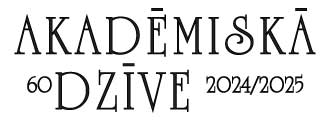A new social reality ‒ the community of “Ukraine in Latvia”
DOI:
https://doi.org/10.22364/adz.60.03Keywords:
migration, place, religious community, Orthodox Church in Ukraine, pastoral careAbstract
The article discusses solutions to the migration research challenge that appeared in 2022, when the flow of war refugees from Ukraine to Latvia increased very rapidly and in large numbers following Russia’s full-scale invasion of Ukraine. The challenge was to develop a conceptual framework to understand and describe the newcomer community and outline strategies for its integration in Latvia. The use of philosophical phenomenology and topological hermeneutics in the research made it possible to develop knowledge about the newcomer community, which is necessary to quickly get to know the values, attitudes, traditions, and regional characteristics of the newcomers.
Due to its geographical proximity, a similar historical fate and geopolitical threats, Latvian society welcomed the Ukrainian war refugees with great openness and it was evident that a community of solidarity and even fraternity was emerging between the newcomers and their hosts, forming a new social reality that can be described as the community of “Ukraine in Latvia”. This concept reflects the methodology of its development: the use of the concept of place as a synthesis of human geography and philosophical approaches, which sees migration as the movement of a person from one place to another with its own locus, i.e., values, attitudes, and traditions. The mutual need of newcomers and hosts to get to know each other quickly and to coexist is explained by the functioning of cognitive rituals, the key dynamic element of which is construction of the embodiment of one’s own world. The approach developed in the article is also applied to the study of religious communities as an ‒ as yet ‒ unconscious resource of migration, using as illustrations the communities of the Latin and Greek Catholic Rite, and the problem of pastoral care in the communities of the Orthodox Church which is influenced by the political nature of the Church’s activity in Ukraine.
References
A. I. (2024) Personiska intervija ar autoru, 14.06.2024., Dzērbene. Intervējusi S. Krūmiņa-Koņkova.
Anderson, R. (1996) Nine psycho-spiritual characteristics of spontaneous and involuntary weeping. Journal of Transpersonal Psychology, 28 (2), 167–173.
Bauskas Dzīve (2022) Baušķenieki kopā ar ukraiņiem atzīmē Višivankas dienu Rīgā. Bauskas Dzīve (20.05.2022.). https://bauskasdzive.lv/foto-un-video/foto-bauskenieki-kopa-ar-ukrainiem-atzime-visivankas-dienu-
riga/ (skatīts 12.08.2024.).
Bertossi, C.; Duyvendak, J. W.; Foner, N. (2021) Past in the present: migration and the uses of history in the contemporary era. Journal of Ethnic and Migration Studies, 47 (18), 4155–4171. https://doi.org/10.1080/1369183X.2020.1812275. DOI: https://doi.org/10.1080/1369183X.2020.1812275
Boyer, P.; Liénard, P. (2020) Ingredients of ‘rituals’ and their cognitive underpinnings. The Royal Society Publishing. https://royalsocietypublishing.org/doi/10.1098/rstb.2019.0439 (skatīts 12.08.2024.).
Cesare Di, D. (2020) Resident foreigners. A Philosophy of Migration. Cambridge: Polity Press.
Collins, R. (2005) Interaction Ritual Chains. Princeton: Princeton University Press. https://doi.org/10.1515/
Dahlin, M. K.; Larsson, O. L.; Winnel, A. (2021) Religion, Migration, and Existential Wellbeing. New York: Routledge.
Dessewffy, T.; Nagi, Z. (2021) Dreaming Homogenous ‒ Power Switches of History in Public Discourse in Hungary. Journal of Ethnic and Migration Studies, 47 (18), 4189–4208. https://doi.org/10.1080/1369183X.2020.1812277. DOI: https://doi.org/10.1080/1369183X.2020.1812277
D. M. (2024) Personiska intervija ar autoru, 12.06.2024., Rīga. Intervējusi M. Kiope.
Elden, S. (2009) Philosophy and Human Geography. Kitchin, R.; Thrift, N. (eds) International Encyclopa-edia of Human Geography. Amsterdam: Elsevier, 145–150. DOI: https://doi.org/10.1016/B978-008044910-4.00282-0
Ēvalde, I. (2022) Maskēšanās tīkla darināšana ir kā sapņu ķērāja izgatavošana, tikai sapnis ir ‒ miers. LA.LV (14.03.2022.). https://www.la.lv/maskesanas-tikla-darinasana-ir-ka-sapnu-keraja-izgatavosana-tikai-sapnis-ir-miers (skatīts 12.08.2024.).
Frederiks, M.; Nagy, D. (eds) (2016) Religion, Migration and Identity: Methodological and theological explorations. Leiden, Boston: Brill. DOI: https://doi.org/10.1163/9789004326156
Grīnvalde, R. (2024) Zili dzeltenā Rīga. Letonica, 54, 30–54. https://doi.org/10.35539/LTNC.2024.0054.03. DOI: https://doi.org/10.35539/LTNC.2024.0054.03
Kel’m, N.; Nabozhn’ak, O. (2023) Chomu ukrayintsi, yaki vyyikhaly do Yevropy, hodyat’ do hramiv RPC, yak novi parafiyany vplyvayut’ na yikh stavlennya do viyny. TEXTY. ORG.UA. https://texty.org.ua/articles/108789/zdes-russkyj-duh-yak-vlashtovano-rosijsku-cerkvu-v-yevropi-i-kudy-hodyty-nashym-pereselencyam/ (skatīts 10.08.2024.).
Ķekavas Novads (2022) Akcija “Saulespuķu ceļš” Ukrainas atbalstam Ķekavas novadā. Ķekavas Novads (03.05.2022.). https://kekava.lv/novads/akcija-saulespuku-cels-ukrainas-atbalstam-kekavas-novada/ (skatīts 12.08.2024.).
Malpas, J. (2012) Putting Space in Place: Philosophical Topography and Relational Geography. Environ-ment and Planning D. Society and Space, 30 (2), 226–242. DOI: https://doi.org/10.1068/d20810
Malpas, J. (2018) Place and experience. A Philosophical Topography. 2nd ed. Oxon, New York: Routled-ge. DOI: https://doi.org/10.4324/9781315265445
Oficiālās statistikas portāls (2024) Iedzīvotāji pēc valstiskās piederības. https://data.stat.gov.lv/pxweb/lv/OSP_PUB/START__POP__IR__IRV/IRV010 (skatīts 10.08.2024.).
Oztabak, M. U. (2020) Refugee Children’s Drawings: Reflections of Migration and War. International Journal of Educational Methodology, 6 (2), 481–495. https://doi.org/10.12973/ijem.6.2.481. DOI: https://doi.org/10.12973/ijem.6.2.481
Philips, M. (2005) Philosophical Arguments in Human Geography. Phillips, M. (ed.) Contested Worlds. An Introduction to Human Geography. London, New York: Routledge, 13–85. https://doi.org/10.4324/9781315259406-2. DOI: https://doi.org/10.4324/9781315259406-2
Razumkov Centre (2023) Religiosity, trust in the Church, confessional affiliation and inter-church rela-tions in Ukrainian society (November, 2023). Razumkov Centre. https://razumkov.org.ua/en/research-areas/surveys/religiosity-trust-in-the-church-confessional-affiliation-and-inter-church-relations-in-ukrainian-society-november-2023 (skatīts 10.08.2024.).
RISU (2023) U Rizi zaproshuvaly ukrayintsiv na pravoslavne bohosluzhinnya. Religious Information Ser-vice of Ukraine. https://risu.ua/u-rizi-ukrayinciv-zaprosili-na-pravoslavne-bogosluzhinnya_n139151 (skatīts 10.08.2024.).
Sidoroviča, T. (2022) Latvijā līgo arī no kara patvērumu radušie ukraiņi. Ciemos pie Kalniņu ģimenes Saulkrastu novadā. LSM.lv (24.06.2022.). https://www.lsm.lv/raksts/zinas/latvija/latvija-ligo-ari-no-kara-patverumu-radusie-ukraini-ciemos-pie-kalninu-gimenes-saulkrastu-novada.a462863/ (skatīts 07.10.2024.).
UGCC (2022) Ukrainian Greek-Catholic Church Pastoral-Migration Department (29.09.2022.). Facebook account.
UNHCR (2024) Ukrainian Refuge Situation. UNHCR Operational Data Portal. https://ej.uz/Ukrainian_refuges_Latvia (skatīts 10.08.2024.).
Waxman, O. B. (2022) What to Know About the Meaning of Sunflowers in Ukraine. Time (04.03.2022.). https://time.com/6154400/sunflowers-ukraine-history/ (skatīts 12.08.2024.).
Williams, J. (2023) Embodied world construction: a phenomenology of ritual. Religious Studies, 60 (1), 103–122. https://doi.org/10.1017/S0034412523000033. DOI: https://doi.org/10.1017/S0034412523000033
Zanfrini, L. (ed.) (2020) Migrants and Religion: Paths, Issues, and Lenses. A Multidisciplinary and Multi-Sited. Study on the Role of Religious Belongings in Migratory and Integration Processes. Leiden, Bos-ton: Brill. DOI: https://doi.org/10.1163/9789004429604
Zigon, J. (2021) How is it between us? Relational ethics and transcendence. Journal of Royal Anthropo-logical Institute, 27, 384–401. https://doi.org/10.1111/1467-9655.13496. DOI: https://doi.org/10.1111/1467-9655.13496
Downloads
Published
Issue
Section
License
Copyright (c) 2024 Latvijas Universitāte

This work is licensed under a Creative Commons Attribution-NonCommercial 4.0 International License.


